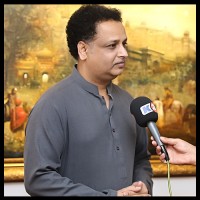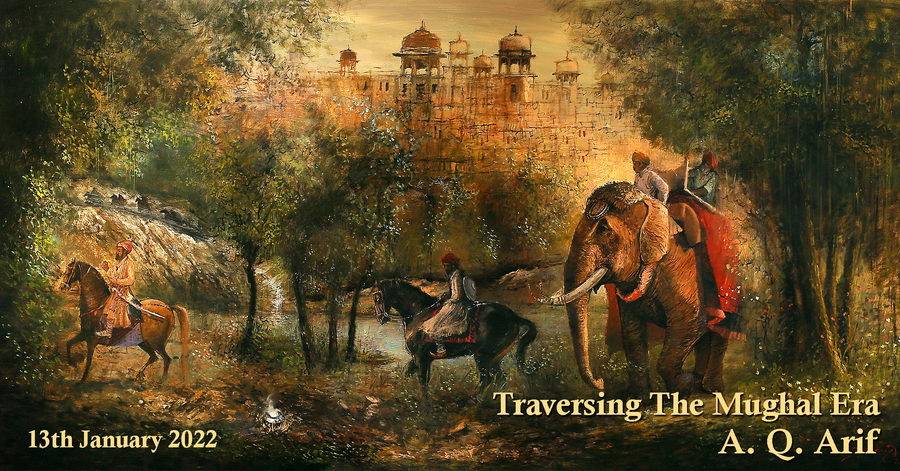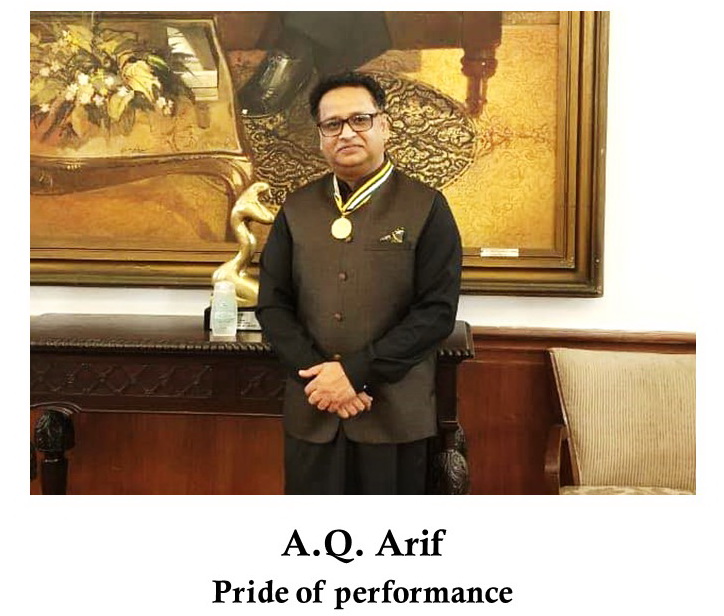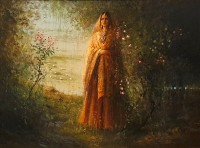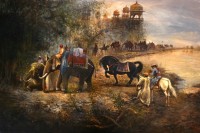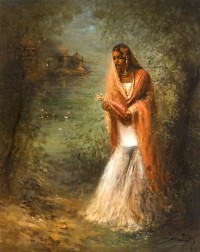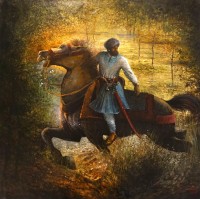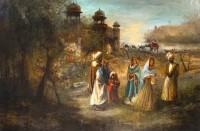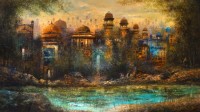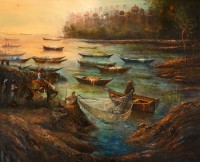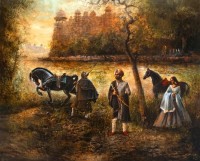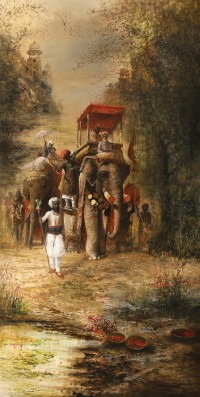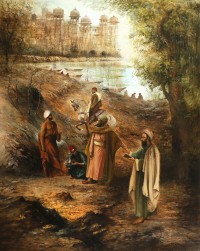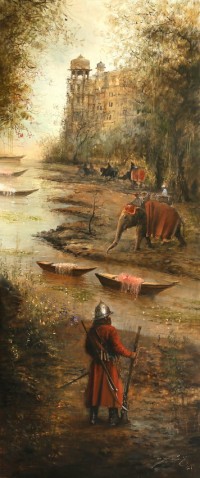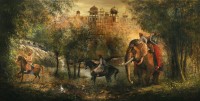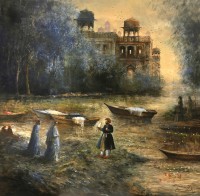Menu
- HOME
- CURATOR'S CHOICE
- NEW ARRIVALS
- EXHIBITIONS
- Land, Lore, and Living Memory By Naseeb Khan 14th - 18th February 2026
- Unfolding Stories By Shazly Khan 4th - 8th February 2026
- Ode to Home by Ariba Akhlaque 15th - 19th Jan 2026
- Shadow of Nature by Tahir Bilal Ummi (10th - 13th Jan 2026)
- The Call of Love by GN Qazi (23 - 27 Dec 2025)
- ROLL CALL 3 - An Alumni Show - (11 - 13 Dec 2025)
- Guardians of the Spirit by SA Noory (4th - 9th Dec 2025)
- Unfolding Identities - Group Exhibition (20th - 25th Nov 2025)
- Rhythms Of The Everyday by Salman Farooqi (6th - 10th Nov 2025)
- Chronicles of Change by Irtiza Kazmi (9th - 13th Oct 2025)
- Unfolded Narrative - Group Exhibition (25th - 29th Sep 2025)
- Spring Blooms - Group Exhibition (4th to 10th Sep 2025)
- Theme of Expression by Group Show (22nd to 27th May 2025)
- A Cultural Tapestry by Hussain Chandio (25th Feb-2025)
- Feminists Charisma V by Talented Women Artists (22nd - 24th Feb 2025)
- Veiled Truths by AS-Rind (6th - 10th February-2025)
- Fragments of Pakistan From street to serenity by Hanif Shehzad
- MY LOVE FOR STORY TELLING by Shazly Khan (9th – 15th January 2025)
- Valley of the Quest by Farrukh Shahab (19th – 24th December 2024)
- Cultural Blossoms by Bandah Ali (5th - 9th December 2024)
- Stories from Grannys House by Shazia Salman (21 - 25 Nov 2024)
- Hues of Nature by Irtiza Kazmi (8th -10thNovember 2024)
- The Pakistan Saga IV A Dialogue with Nature by Sabiha Nasr-ud-Deen (10th - 14th October 2024)
- Through the Singular Eye By S.M. Fawad (19th –23rdSeptember 2024)
- Resurrection by Aisha Mahmood (13- Aug-2024)
- TIMELESS VIEWS (27th - 29th June 2024)
- Magical Lines of Endless Mosaic By Chitra Pritam (6th – 9th June 2024)
- Feminists Charisma IV-Group Show (29th - February 2024)
- Mystical Minarets by S. A. Noory (18th – 22nd January 2024)
- Celebrating The Heritage of Karachi Volume II by Hamir Soomro (10th – 11th January 2024)
- Metropolitan Mosaic by Salman Farooqi (7th – 11th December 2023)
- Through the eyes of silence by Akram Dost Baloch (17th – 21st November 2023)
- Cityscape & Beyond by Hanif Shehzad (2nd - 6th November 2023)
- The Pakistan Saga III by Sabiha Nasr-ud-Deen (12th - 16th October 2023)
- STONE & STORIES by S.M. Fawad (30th September – 4th October 2023)
- Dancing Colours by Bandah Ali (7th - 11th September 2023)
- TAQWEEM by M. ZUBAIR MUGHA (1st – 5th June 2023)
- Timeless Expressions by Shakil Ismail (20th – 23th March 2023)
- Feminists Charisma III-Group Show (13th - 15th March 2023)
- The Harbinger by Faiza Bilgrami (9th - 11th March 2023)
- Sukoon by S. A. Noory (2nd -6th March-2023)
- Raqs-E-Haq by Khalid Khan - KAAY (17th - 21th February 2023)
- Avian Humanoids by Farrukh Shahab (2nd-6th February-2023)
- I have a story to tell by Shazly Khan (19th -23rd January 2023)
- RADIANCE OF ISLAMIC ART by Amberin Asad and Samreen Wahedna (22nd to 26th Dec-2022)
- TERAUSURES OF VERISM Group Show (8th to 12th Dec-2022)
- Unbroken Promises by Iqbal Durrani (24th -28th November 2022)
- Pehchan (12th to 16th November 2022)
- Voice of Movement by Saeed Kureshi (3rd to 7th November 2022)
- The Pakistan Sage II by Sabiha Nasr-ud-Deen (20th - 24th October 2022)
- Hues Of Dusk by Zulfiqar Ali Zulfi (13th - 17th October 2022)
- The Truth of Realism by SM Fawad (26th - 30th March 2022)
- Feminists Charisma by Talented Women Artists (19th 22nd March 2022)
- Scenic Stories By Hanif Shehzad (10th – 14th March 2022)
- Meandering Lines of Endless Mosaic by Chitra Pritam (24th - 28th Feb 2022)
- Indus Muse by Moazzam Ali (3rd - 7th Feb-2022)
- Traversing The Mughal Era by A.Q. Arif (13th –20th January 2022)
- NEW HORIZONS (17th - 20th December 2021)
- Spiritual Geometry by Shakil Ismail (9th-13th December 2021)
- Pyaar Kahani (18th - 22th November 2021)
- Tasalsul By S. A. Noory (21th - 25th October 2021)
- Contemporary Satire (30th September - 4th October 2021)
- TALAASH - تلاش (9th-14th September 2021)
- Life is a Journey not a Destination By Abdul Jabbar (8th -14th July 2021)
- REAL DEPICTION OF THE ORDINARY By Akram Spaul & Aamir Qureshi (1st - 4th April 2021)
- Hamir Soomro (25th - 29th March 2021)
- Hamd Calligraphy Group Show (18th 22nd March 2021)
- Awaz E Jaras by A. S. Rind (11th - 15th March 2021)
- Prologue of Realism by S. M. Fawad (25th Feb - 1st March 2021)
- WEAVING NARRATIVES OF THAR by NADIR ALI JAMALI (11th-17th February 2021)
- Enchanting Beauty by Hajra Mansoor (14th -20th January 2021)
- Fables of Beauty by Iqbal Durrani (26th - 30th November 2020)
- Whispering Meadows by Zulfiqar Ali Zulfi (22th - 28th October 2020)
- DARBAR-E-JIDDAT (24th - 30th Sep 2020)
- 2020 - The New Normal
- Epic Mughals by A.Q.Arif (12-17 March 2020)
- REALISTIC ARTISTRY by S. M. Fawad (09-11 January 2020)
- Sacred Submission by Mussarat Arif (19-21 Dec 2019)
- Essence of Pakistan (28-30 Nov 2019)
- Nostagia (14-16 Nov 2019)
- Artistic Emergence (26-28 Sep 2019)
- Abdul Hayee (11-13 Apr 2019)
- Untamed, Raw Beauty by Iqbal Durrani (21-24 Mar 2019)
- Rukhe Neelofer Exhibitions (08-10 Mar 2019)
- S. A. Noory Exhibitions (14-16 Feb 2019)
- Panorama of Heritage by A.Q Arif (31 Jan - 03 Feb-19)
- Moazzam Ali (17-19 Jan 2019)
- Realism by S. M. Fawad (03 - 05 Jan 2019)
- Hues Of Diversity-II (21 Dec 2018)
- Unrequited by AS Rind - ( 8 - 10 Nov 2018)
- Light & Shade (11 - 13 Oct 2018)
- INDEPENDENCE by Rida Kazmi (14 - 18 Aug 2018)
- Trendsetters-II (28th Jul 2018)
- Dilemmas (12 - 15 May 2018)
- Wahab Jaffer's Exhibition (3 - 9 May 2018)
- Art for Eternity - (19 - 22 Apr 2018)
- Colours of Youth II - (7 Apr, 2018)
- Charcoal - (22 - 25 Mar, 2018)
- Rukhe Neelofar's Exhibition - (22 - 25 Feb 2018)
- The Prism of Life - (1 - 7 Feb 2018)
- S. A. Noory's Exhibition - (8 - 13 Jan 2018)
- Mystical Mosaic - (27 Nov - 2 Dec 2017)
- Tangibility in Time - (26 Oct - 1 Nov 2017)
- Abdullah Ali's Exhibition - (14 - 20 Sep 2017)
- Perceptive Union - (13 - 19 April, 2017)
- Dar-e-Justuju - (16 - 22 Mar 2017)
- Rhythm of Kolachi - (23 - 29 Feb 2017)
- Colours of Youth I - (2 Feb 2017)
- Structured Harmony - (15 - 21 Dec 2016)
- Hues of Diversity - (10 - 16 Nov 2016)
- Poetic Palette - (29 Sep - 5 Oct 2016)
- Colours of Culture - (20 - 26 Aug 2016)
- Dhows of Kolachi - (9 - 15 Apr 2016)
- Vintage Velocity - (12 - 18 Mar 2016)
- Linear Concepts - (6 - 12 Feb 2016)
- Scenic Stories - (19 - 26 Dec 2015)
- Painterly Realisum - (3 - 9 Oct 2015)
- Trendsetters - (12 - 8 Aug 2015)
- Me Raqsam - (30 May - 6 Jun 2015)
- Surreal Sensibilities - (18 - 24 Apr 2015)
- Coexisting Contrast - (21 - 27 Mar 2015)
- ARTpeace - (21 - 25 Fab 2015)
- Spiritual Submission - (27 Nov - 6 Dec 2014)
- Parrallel Perceptions - (18 - 27 Sep 2014)
- Akram Spaul's Exhibition - (28 Aug - 6 Sep 2014)
- Javed Qamar's Exhibition - (23 - 31 May 2014)
- Mehtab Ali's Exhibition - (19-28 Apr 2014)
- Distinct Excursions - (8 - 17 Mar 2014)
- Shan Amrohvi's Exhibition - (12-18 Jan 2014)
- GENRE
- Abstract
- Animals Paintings
- Birds Paintings
- Boats & Ships
- Building & Architecture
- Buzkashi
- Calligraphy
- Camel Paintings
- Cars Paintings
- Ceramic Art
- Cityscape
- Collage Work On Paper
- Crow Paintings
- Darwaish & Sufism
- Figurative
- Floral
- Horse Paintings
- Islamic Art
- SHOP BY ARTIST
- A. ALI
- A. H. Rizvi
- A. Q. Arif
- A. S. Rind
- Aamir Khatri
- Aayesha Noor
- Abbas Kamangar
- Abdul Hameed
- Abdul Hayee
- Abdul Jabbar
- Abdul Jabbar Gull
- Abdul Rahim Awan
- Abdul Rasheed
- Abdul Wahab
- Abdullah Ali
- Abdullah Tahir
- Abeera Atique
- Abid Hasan
- Abid Khalil
- Abid khan
- Abid Zaman
- Abida Daihri
- Abrar Ahmed
- Abu Hanzla
- Adnan Ahmed
- Adnan Ali Manganhar
- Afsheen
- Aftab Zafar
- Agha Jandan
- Ahmed Anver
- Ahmed Khan
- Ahsan Mohiuddin
- Ahwar Nasir
- Aisha Khan
- Aisha Mahmood
- Ajab Khan
- Akram Dost Baloch
- Akram Spaul
- Alefiya Abbas Ali
- Ali Abbas
- Amberin Asad Javaid
- Amerzish Khalid
- Amir Ahmed Qureshi
- Amir jamil
- Amir Taj
- Amjad Ali Talpur
- Amjad But
- Amjad Hussain
- Amna Siddiqui
- Anas Abro CEAD
- Aniqa Fatima
- Anjum Ayaz
- Anmool Kumari
- ANNAL HAQUE
- Anwar Haq
- Anwar Maqsood
- Anwer Sheikh
- Aqib Faiz
- Aqiq Ahsan
- Ariba Akhlaque
- Ariba Mugal
- Arif Ansari
- Arif Channa
- Arif Khokhar
- Arsalan Naqvi
- Arshad Shirazy
- Arshed Maqbool
- Arusha Javaid
- Asad Hussain
- Ashair Naeem
- Ashkal
- Ashraf
- Asif Ghayaz
- Atif Hussain
- Aurangzib Hanjra
- Ayesha Ahmed
- Ayesha Siddiqui
- Ayla Bushra
- Azadi Abbasi
- Azra Wahab
- Babar Moghal
- Baber Azeemi
- Bandah Ali
- Beenish Zia Abbasi
- Behzad
- Bilal Mirza
- BIN QULANDER
- Chitra Pritam
- Cuneyt Senyavas
- Danish Raza
- Dilawar Mirza
- Doda Baloch
- Durab
- Ejaz Khan
- Emaan Rauf
- Eqbal Mehdi
- FAHAD ALI
- Faiqa Uppal
- Faisal Nawaz CEAD
- Faiza Mangro
- Farah Anwer
- Faran Qureshi
- Faraz Mateen
- Farhan Jaffery
- Farhan Manto
- Fariha Khan
- Farkhanda Shehzad
- Farooq Aftab
- Farrukh Naseem
- Farrukh Shahab
- Farzana Sadiq
- Fasiha Farooq
- Fatima Sheikh CEAD
- Fayaz Ahmed Leghari
- Fayyaz Ali
- Feminists Charisma (Woman Group Show)
- Fiza Fatima CEAD
- Fozia Solangi
- Furqan Katib
- G. N. Qazi
- Ghalib Baqar
- Ghulam Abbas Khaskheli
- Ghulam Markhat
- Ghulam Mustafa
- Ghulam Sakeena CEAD
- Gul-e-Farwa
- Habib Nasir
- Habiba Mughal
- Hafsa
- Hafsa Sarfraz
- Hafsa Shaikh CEAD
- Haider Abbas
- Hajra Bux
- Hajra Mansoor
- Halar CEAD
- Hamid Alvi
- Hamir Soomro
- Hammad Malik
- Hanif Shahzad
- Harji Lal
- Haroon Bin Abid
- Hassan Ali
- Hidayat Ullah Mirani
- Hira Khalid
- Hira Shahid
- Hoorelaiba Rafiq Sheikh
- Huma Qazi
- Hussain Chandio
- Huvaida
- Ibne Ali
- Imran Haider
- Imran Khan
- Imran Mushtaq
- Imran Naqvi
- Imran Zaib
- Imtiaz Ali
- Iqbal Durrani
- Iqbal Hussain
- Iram Batool
- Irfan Ahmed
- Irtiza Kazmi
- Ishfaq Ali
- Ishrat
- Ishrat Fatima
- Israr Hussain
- Jahangir Alam
- Jala Ali
- Jam Dipper
- Jamal Ahmed
- Janisar Ali
- Javed Qamar
- Javeed
- Javid Tabatabaei
- Jeapal
- Joe Francis Dowden
- Kamran Ahmed
- Kamran Khaskhaili
- Kashif Ahmed
- Kashif Shahzad
- Kausar Bhatti
- Kausar Iqbal
- Khalid Khan-Kaay
- Khalid Zoy
- Khilji Naimat
- Khushbakht Soomro
- Khusro Subzwari
- Kiran Arain
- L'passo Benjamin
- Laiba
- Laiba Maqsood
- Lal Mohammad Pathan
- M Alam Jahangir
- M. A. Bukhari
- M. Ali Supro
- M. Ameen
- M. R. Rahimoo
- M. Rustam Khan
- Maham Siddiqui
- Mahira CEAD
- Mahnoor Ali
- Mahnoor Baloch
- Mahnur Iqbal CEAD
- Malik Tariq
- Mansoor
- Mansoor Rahi
- Mansur Aye
- Maqbool Ahmed
- Mariya Shaikh
- Maryam Arslan
- Maryam Inam
- Maryam Irshad
- Mashkoor Raza
- Mashooq Ali Rajar CEAD
- Masooma Rizvi
- Mazhar Qureshi
- Meher Afroz
- Mehtab Ali
- Mehwish Azam
- Moazzam Ali
- Mohsen Keiany
- Momin Khan
- Momin Waseem Khan
- Moomal CEAD
- Mudasir Hussain
- Mudassar Ali
- Mudeeha Ali
- Mufakhar Subhani
- Mughees Riaz
- Muhammad Abdul
- Muhammad Arif Channa
- Muhammad Arshad
- Muhammad Darab
- Muhammad Hassan
- Muhammad Kashaf
- Muhammad Noman
- Muhammad Waqas
- Muhammad Yousuf
- Muhammad Zubair
- Muhammed Ali Bhatti
- Muhammed Qasim CEAD
- Muneeb Ali
- Muntehaa Azad
- Murk Malik
- Mussarat Arif
- Mutaib Shah
- Muzammil Hussain
- Nabiha Gillani
- Nadir Ali Jamali
- Naeem Rind
- Naeem Soomro
- Nafisa Saifuddin
- Naheed Afridi
- Naheed Zia
- Naish Rafi
- Naseeb Khan
- Nasir Shahzad
- Naureen Usmani
- Naushad Alam
- Naushad-ur-Rehman
- Naveed Ahmed
- Naveed Hussain
- Naveera
- Nawaid Khan
- Nayab Noor
- Nazar Ul Islam
- Nimrah Sheikh
- Nisar Ahmed
- Noor-Ul-Huda
- Noreen Akthar
- Noreen Rashid
- Noshi
- Ozma Bhatti
- Pushplata
- Qaiser Khan
- Qamar
- Qasim Bugti
- Rabia Ali
- Rabia Ehsaan
- Rabia Mushkur
- Rabia Qazi
- Rabia Zuberi
- Rafique Somroo
- Rashid Ali
- Rauf Mughal
- Razia Sehar
- Riaz Rafi
- Rida Kazmi
- Rohail Ghouri
- Rubab Naqvi
- S. A. Noory
- S. M. Fawad
- S. M. Naqvi
- Saadia Shahid
- Saba Qayoom Leghari
- Sabeen Rashid
- Sabiha Nasr-ud-Deen
- Sabir Ali
- Sadaf Yasir
- Sadaf Zeeshan
- Sadequain
- Sadia Arif
- Sadia Jamal
- Sadiq Hussain Makhdoom
- Saeed Ghani
- Saeed Kureshi
- Saeed Lakho
- Sahar Atta
- Saher Shah
- Sahrish Aziz
- Saifullah
- Saima Aamir
- Salman Farooqi
- Saman Qureshi CEAD
- Samina Mumtaz
- Samra Malik
- Sana Nezam
- Saqib Javed
- Sarah Shar
- Sarfraz Musawir
- Scharjeel Sarfaraz
- Shah Jahan
- Shahzad
- Shaima Umer
- Shaista Momin
- Shakeel Mirza
- Shakil Ismail
- Shamshad Baig
- Shamsuddin Tanwri
- Shan Amrohvi
- Shanzay Subzwari
- Shariq Ayaz
- Sharjil Baloch
- Shazia Langah
- Shazia Munir
- Shazia Salman
- Shazly Khan
- Sheema Khan
- Shiblee Muneer
- Shuja Mirza
- Sidra Sattar
- Sohaina Elia
- Sumaira Amin
- Suman Riz
- Sumbel Sajid
- Surhan CEAD
- Syed A. Irfan
- Syed Adeel
- Syed Ali Haider Rizvi
- Syed Ali Shah
- Syed Baqar Raza
- Syed Rizwan
- Syed Shariq Ayaz
- Syed Tanveer Shams
- Syeda Nadia Raza
- Tahir Bilal Ummi
- Tanweer Farooqi
- Tariq
- Tariq Hussain
- Tariq Javed
- Tariq Mahmood
- Tasneem F. Inam
- Tassaduq Sohail
- Tayyab Ahmed Shaikh
- Tayyaba Aziz
- Tayyaba Sabir
- Thesis Work, CEAD 2015
- Tooba Bashir
- Tooba Sami
- Tooba Shaikh
- Umaina Khan
- Urooj Khowaja
- Uroosa Shaikh CEAD
- Uzma Rashid
- Uzma Umar
- Vaniza
- Wahab Jaffar
- Wajeeha Mughal
- Waliullah
- Waqas Yahya
- WARDA R B
- Wasi Haider
- Wingus Raheem
- Yamna Ghayoor
- Yousaf Sheikh
- Zabad Anwar
- Zafar-Mahmood
- Zaheen Ahmed
- Zahid Ashraf
- Zahid Saleem
- Zainab Aziz
- Zaki Sheikh
- Zakir Ali
- Zameer Hussain
- Zeeshan Memon
- Zehra Fatima Qazi
- Zobia Shah
- Zohaib Rind
- Zubi Ali
- Zulekha Mandokhail
- Zulfiqar Ali Zulfi
- Zulqarnain
- SHOP BY PRICE
- HOME
- CURATOR'S CHOICE
- NEW ARRIVALS
- EXHIBITIONS
- Land, Lore, and Living Memory By Naseeb Khan 14th - 18th February 2026
- Unfolding Stories By Shazly Khan 4th - 8th February 2026
- Ode to Home by Ariba Akhlaque 15th - 19th Jan 2026
- Shadow of Nature by Tahir Bilal Ummi (10th - 13th Jan 2026)
- The Call of Love by GN Qazi (23 - 27 Dec 2025)
- ROLL CALL 3 - An Alumni Show - (11 - 13 Dec 2025)
- Guardians of the Spirit by SA Noory (4th - 9th Dec 2025)
- Unfolding Identities - Group Exhibition (20th - 25th Nov 2025)
- Rhythms Of The Everyday by Salman Farooqi (6th - 10th Nov 2025)
- Chronicles of Change by Irtiza Kazmi (9th - 13th Oct 2025)
- Unfolded Narrative - Group Exhibition (25th - 29th Sep 2025)
- Spring Blooms - Group Exhibition (4th to 10th Sep 2025)
- Theme of Expression by Group Show (22nd to 27th May 2025)
- A Cultural Tapestry by Hussain Chandio (25th Feb-2025)
- Feminists Charisma V by Talented Women Artists (22nd - 24th Feb 2025)
- Veiled Truths by AS-Rind (6th - 10th February-2025)
- Fragments of Pakistan From street to serenity by Hanif Shehzad
- MY LOVE FOR STORY TELLING by Shazly Khan (9th – 15th January 2025)
- Valley of the Quest by Farrukh Shahab (19th – 24th December 2024)
- Cultural Blossoms by Bandah Ali (5th - 9th December 2024)
- Stories from Grannys House by Shazia Salman (21 - 25 Nov 2024)
- Hues of Nature by Irtiza Kazmi (8th -10thNovember 2024)
- The Pakistan Saga IV A Dialogue with Nature by Sabiha Nasr-ud-Deen (10th - 14th October 2024)
- Through the Singular Eye By S.M. Fawad (19th –23rdSeptember 2024)
- Resurrection by Aisha Mahmood (13- Aug-2024)
- TIMELESS VIEWS (27th - 29th June 2024)
- Magical Lines of Endless Mosaic By Chitra Pritam (6th – 9th June 2024)
- Feminists Charisma IV-Group Show (29th - February 2024)
- Mystical Minarets by S. A. Noory (18th – 22nd January 2024)
- Celebrating The Heritage of Karachi Volume II by Hamir Soomro (10th – 11th January 2024)
- Metropolitan Mosaic by Salman Farooqi (7th – 11th December 2023)
- Through the eyes of silence by Akram Dost Baloch (17th – 21st November 2023)
- Cityscape & Beyond by Hanif Shehzad (2nd - 6th November 2023)
- The Pakistan Saga III by Sabiha Nasr-ud-Deen (12th - 16th October 2023)
- STONE & STORIES by S.M. Fawad (30th September – 4th October 2023)
- Dancing Colours by Bandah Ali (7th - 11th September 2023)
- TAQWEEM by M. ZUBAIR MUGHA (1st – 5th June 2023)
- Timeless Expressions by Shakil Ismail (20th – 23th March 2023)
- Feminists Charisma III-Group Show (13th - 15th March 2023)
- The Harbinger by Faiza Bilgrami (9th - 11th March 2023)
- Sukoon by S. A. Noory (2nd -6th March-2023)
- Raqs-E-Haq by Khalid Khan - KAAY (17th - 21th February 2023)
- Avian Humanoids by Farrukh Shahab (2nd-6th February-2023)
- I have a story to tell by Shazly Khan (19th -23rd January 2023)
- RADIANCE OF ISLAMIC ART by Amberin Asad and Samreen Wahedna (22nd to 26th Dec-2022)
- TERAUSURES OF VERISM Group Show (8th to 12th Dec-2022)
- Unbroken Promises by Iqbal Durrani (24th -28th November 2022)
- Pehchan (12th to 16th November 2022)
- Voice of Movement by Saeed Kureshi (3rd to 7th November 2022)
- The Pakistan Sage II by Sabiha Nasr-ud-Deen (20th - 24th October 2022)
- Hues Of Dusk by Zulfiqar Ali Zulfi (13th - 17th October 2022)
- The Truth of Realism by SM Fawad (26th - 30th March 2022)
- Feminists Charisma by Talented Women Artists (19th 22nd March 2022)
- Scenic Stories By Hanif Shehzad (10th – 14th March 2022)
- Meandering Lines of Endless Mosaic by Chitra Pritam (24th - 28th Feb 2022)
- Indus Muse by Moazzam Ali (3rd - 7th Feb-2022)
- Traversing The Mughal Era by A.Q. Arif (13th –20th January 2022)
- NEW HORIZONS (17th - 20th December 2021)
- Spiritual Geometry by Shakil Ismail (9th-13th December 2021)
- Pyaar Kahani (18th - 22th November 2021)
- Tasalsul By S. A. Noory (21th - 25th October 2021)
- Contemporary Satire (30th September - 4th October 2021)
- TALAASH - تلاش (9th-14th September 2021)
- Life is a Journey not a Destination By Abdul Jabbar (8th -14th July 2021)
- REAL DEPICTION OF THE ORDINARY By Akram Spaul & Aamir Qureshi (1st - 4th April 2021)
- Hamir Soomro (25th - 29th March 2021)
- Hamd Calligraphy Group Show (18th 22nd March 2021)
- Awaz E Jaras by A. S. Rind (11th - 15th March 2021)
- Prologue of Realism by S. M. Fawad (25th Feb - 1st March 2021)
- WEAVING NARRATIVES OF THAR by NADIR ALI JAMALI (11th-17th February 2021)
- Enchanting Beauty by Hajra Mansoor (14th -20th January 2021)
- Fables of Beauty by Iqbal Durrani (26th - 30th November 2020)
- Whispering Meadows by Zulfiqar Ali Zulfi (22th - 28th October 2020)
- DARBAR-E-JIDDAT (24th - 30th Sep 2020)
- 2020 - The New Normal
- Epic Mughals by A.Q.Arif (12-17 March 2020)
- REALISTIC ARTISTRY by S. M. Fawad (09-11 January 2020)
- Sacred Submission by Mussarat Arif (19-21 Dec 2019)
- Essence of Pakistan (28-30 Nov 2019)
- Nostagia (14-16 Nov 2019)
- Artistic Emergence (26-28 Sep 2019)
- Abdul Hayee (11-13 Apr 2019)
- Untamed, Raw Beauty by Iqbal Durrani (21-24 Mar 2019)
- Rukhe Neelofer Exhibitions (08-10 Mar 2019)
- S. A. Noory Exhibitions (14-16 Feb 2019)
- Panorama of Heritage by A.Q Arif (31 Jan - 03 Feb-19)
- Moazzam Ali (17-19 Jan 2019)
- Realism by S. M. Fawad (03 - 05 Jan 2019)
- Hues Of Diversity-II (21 Dec 2018)
- Unrequited by AS Rind - ( 8 - 10 Nov 2018)
- Light & Shade (11 - 13 Oct 2018)
- INDEPENDENCE by Rida Kazmi (14 - 18 Aug 2018)
- Trendsetters-II (28th Jul 2018)
- Dilemmas (12 - 15 May 2018)
- Wahab Jaffer's Exhibition (3 - 9 May 2018)
- Art for Eternity - (19 - 22 Apr 2018)
- Colours of Youth II - (7 Apr, 2018)
- Charcoal - (22 - 25 Mar, 2018)
- Rukhe Neelofar's Exhibition - (22 - 25 Feb 2018)
- The Prism of Life - (1 - 7 Feb 2018)
- S. A. Noory's Exhibition - (8 - 13 Jan 2018)
- Mystical Mosaic - (27 Nov - 2 Dec 2017)
- Tangibility in Time - (26 Oct - 1 Nov 2017)
- Abdullah Ali's Exhibition - (14 - 20 Sep 2017)
- Perceptive Union - (13 - 19 April, 2017)
- Dar-e-Justuju - (16 - 22 Mar 2017)
- Rhythm of Kolachi - (23 - 29 Feb 2017)
- Colours of Youth I - (2 Feb 2017)
- Structured Harmony - (15 - 21 Dec 2016)
- Hues of Diversity - (10 - 16 Nov 2016)
- Poetic Palette - (29 Sep - 5 Oct 2016)
- Colours of Culture - (20 - 26 Aug 2016)
- Dhows of Kolachi - (9 - 15 Apr 2016)
- Vintage Velocity - (12 - 18 Mar 2016)
- Linear Concepts - (6 - 12 Feb 2016)
- Scenic Stories - (19 - 26 Dec 2015)
- Painterly Realisum - (3 - 9 Oct 2015)
- Trendsetters - (12 - 8 Aug 2015)
- Me Raqsam - (30 May - 6 Jun 2015)
- Surreal Sensibilities - (18 - 24 Apr 2015)
- Coexisting Contrast - (21 - 27 Mar 2015)
- ARTpeace - (21 - 25 Fab 2015)
- Spiritual Submission - (27 Nov - 6 Dec 2014)
- Parrallel Perceptions - (18 - 27 Sep 2014)
- Akram Spaul's Exhibition - (28 Aug - 6 Sep 2014)
- Javed Qamar's Exhibition - (23 - 31 May 2014)
- Mehtab Ali's Exhibition - (19-28 Apr 2014)
- Distinct Excursions - (8 - 17 Mar 2014)
- Shan Amrohvi's Exhibition - (12-18 Jan 2014)
- GENRE
- Abstract
- Animals Paintings
- Birds Paintings
- Boats & Ships
- Building & Architecture
- Buzkashi
- Calligraphy
- Camel Paintings
- Cars Paintings
- Ceramic Art
- Cityscape
- Collage Work On Paper
- Crow Paintings
- Darwaish & Sufism
- Figurative
- Floral
- Horse Paintings
- Islamic Art
- SHOP BY ARTIST
- A. ALI
- A. H. Rizvi
- A. Q. Arif
- A. S. Rind
- Aamir Khatri
- Aayesha Noor
- Abbas Kamangar
- Abdul Hameed
- Abdul Hayee
- Abdul Jabbar
- Abdul Jabbar Gull
- Abdul Rahim Awan
- Abdul Rasheed
- Abdul Wahab
- Abdullah Ali
- Abdullah Tahir
- Abeera Atique
- Abid Hasan
- Abid Khalil
- Abid khan
- Abid Zaman
- Abida Daihri
- Abrar Ahmed
- Abu Hanzla
- Adnan Ahmed
- Adnan Ali Manganhar
- Afsheen
- Aftab Zafar
- Agha Jandan
- Ahmed Anver
- Ahmed Khan
- Ahsan Mohiuddin
- Ahwar Nasir
- Aisha Khan
- Aisha Mahmood
- Ajab Khan
- Akram Dost Baloch
- Akram Spaul
- Alefiya Abbas Ali
- Ali Abbas
- Amberin Asad Javaid
- Amerzish Khalid
- Amir Ahmed Qureshi
- Amir jamil
- Amir Taj
- Amjad Ali Talpur
- Amjad But
- Amjad Hussain
- Amna Siddiqui
- Anas Abro CEAD
- Aniqa Fatima
- Anjum Ayaz
- Anmool Kumari
- ANNAL HAQUE
- Anwar Haq
- Anwar Maqsood
- Anwer Sheikh
- Aqib Faiz
- Aqiq Ahsan
- Ariba Akhlaque
- Ariba Mugal
- Arif Ansari
- Arif Channa
- Arif Khokhar
- Arsalan Naqvi
- Arshad Shirazy
- Arshed Maqbool
- Arusha Javaid
- Asad Hussain
- Ashair Naeem
- Ashkal
- Ashraf
- Asif Ghayaz
- Atif Hussain
- Aurangzib Hanjra
- Ayesha Ahmed
- Ayesha Siddiqui
- Ayla Bushra
- Azadi Abbasi
- Azra Wahab
- Babar Moghal
- Baber Azeemi
- Bandah Ali
- Beenish Zia Abbasi
- Behzad
- Bilal Mirza
- BIN QULANDER
- Chitra Pritam
- Cuneyt Senyavas
- Danish Raza
- Dilawar Mirza
- Doda Baloch
- Durab
- Ejaz Khan
- Emaan Rauf
- Eqbal Mehdi
- FAHAD ALI
- Faiqa Uppal
- Faisal Nawaz CEAD
- Faiza Mangro
- Farah Anwer
- Faran Qureshi
- Faraz Mateen
- Farhan Jaffery
- Farhan Manto
- Fariha Khan
- Farkhanda Shehzad
- Farooq Aftab
- Farrukh Naseem
- Farrukh Shahab
- Farzana Sadiq
- Fasiha Farooq
- Fatima Sheikh CEAD
- Fayaz Ahmed Leghari
- Fayyaz Ali
- Feminists Charisma (Woman Group Show)
- Fiza Fatima CEAD
- Fozia Solangi
- Furqan Katib
- G. N. Qazi
- Ghalib Baqar
- Ghulam Abbas Khaskheli
- Ghulam Markhat
- Ghulam Mustafa
- Ghulam Sakeena CEAD
- Gul-e-Farwa
- Habib Nasir
- Habiba Mughal
- Hafsa
- Hafsa Sarfraz
- Hafsa Shaikh CEAD
- Haider Abbas
- Hajra Bux
- Hajra Mansoor
- Halar CEAD
- Hamid Alvi
- Hamir Soomro
- Hammad Malik
- Hanif Shahzad
- Harji Lal
- Haroon Bin Abid
- Hassan Ali
- Hidayat Ullah Mirani
- Hira Khalid
- Hira Shahid
- Hoorelaiba Rafiq Sheikh
- Huma Qazi
- Hussain Chandio
- Huvaida
- Ibne Ali
- Imran Haider
- Imran Khan
- Imran Mushtaq
- Imran Naqvi
- Imran Zaib
- Imtiaz Ali
- Iqbal Durrani
- Iqbal Hussain
- Iram Batool
- Irfan Ahmed
- Irtiza Kazmi
- Ishfaq Ali
- Ishrat
- Ishrat Fatima
- Israr Hussain
- Jahangir Alam
- Jala Ali
- Jam Dipper
- Jamal Ahmed
- Janisar Ali
- Javed Qamar
- Javeed
- Javid Tabatabaei
- Jeapal
- Joe Francis Dowden
- Kamran Ahmed
- Kamran Khaskhaili
- Kashif Ahmed
- Kashif Shahzad
- Kausar Bhatti
- Kausar Iqbal
- Khalid Khan-Kaay
- Khalid Zoy
- Khilji Naimat
- Khushbakht Soomro
- Khusro Subzwari
- Kiran Arain
- L'passo Benjamin
- Laiba
- Laiba Maqsood
- Lal Mohammad Pathan
- M Alam Jahangir
- M. A. Bukhari
- M. Ali Supro
- M. Ameen
- M. R. Rahimoo
- M. Rustam Khan
- Maham Siddiqui
- Mahira CEAD
- Mahnoor Ali
- Mahnoor Baloch
- Mahnur Iqbal CEAD
- Malik Tariq
- Mansoor
- Mansoor Rahi
- Mansur Aye
- Maqbool Ahmed
- Mariya Shaikh
- Maryam Arslan
- Maryam Inam
- Maryam Irshad
- Mashkoor Raza
- Mashooq Ali Rajar CEAD
- Masooma Rizvi
- Mazhar Qureshi
- Meher Afroz
- Mehtab Ali
- Mehwish Azam
- Moazzam Ali
- Mohsen Keiany
- Momin Khan
- Momin Waseem Khan
- Moomal CEAD
- Mudasir Hussain
- Mudassar Ali
- Mudeeha Ali
- Mufakhar Subhani
- Mughees Riaz
- Muhammad Abdul
- Muhammad Arif Channa
- Muhammad Arshad
- Muhammad Darab
- Muhammad Hassan
- Muhammad Kashaf
- Muhammad Noman
- Muhammad Waqas
- Muhammad Yousuf
- Muhammad Zubair
- Muhammed Ali Bhatti
- Muhammed Qasim CEAD
- Muneeb Ali
- Muntehaa Azad
- Murk Malik
- Mussarat Arif
- Mutaib Shah
- Muzammil Hussain
- Nabiha Gillani
- Nadir Ali Jamali
- Naeem Rind
- Naeem Soomro
- Nafisa Saifuddin
- Naheed Afridi
- Naheed Zia
- Naish Rafi
- Naseeb Khan
- Nasir Shahzad
- Naureen Usmani
- Naushad Alam
- Naushad-ur-Rehman
- Naveed Ahmed
- Naveed Hussain
- Naveera
- Nawaid Khan
- Nayab Noor
- Nazar Ul Islam
- Nimrah Sheikh
- Nisar Ahmed
- Noor-Ul-Huda
- Noreen Akthar
- Noreen Rashid
- Noshi
- Ozma Bhatti
- Pushplata
- Qaiser Khan
- Qamar
- Qasim Bugti
- Rabia Ali
- Rabia Ehsaan
- Rabia Mushkur
- Rabia Qazi
- Rabia Zuberi
- Rafique Somroo
- Rashid Ali
- Rauf Mughal
- Razia Sehar
- Riaz Rafi
- Rida Kazmi
- Rohail Ghouri
- Rubab Naqvi
- S. A. Noory
- S. M. Fawad
- S. M. Naqvi
- Saadia Shahid
- Saba Qayoom Leghari
- Sabeen Rashid
- Sabiha Nasr-ud-Deen
- Sabir Ali
- Sadaf Yasir
- Sadaf Zeeshan
- Sadequain
- Sadia Arif
- Sadia Jamal
- Sadiq Hussain Makhdoom
- Saeed Ghani
- Saeed Kureshi
- Saeed Lakho
- Sahar Atta
- Saher Shah
- Sahrish Aziz
- Saifullah
- Saima Aamir
- Salman Farooqi
- Saman Qureshi CEAD
- Samina Mumtaz
- Samra Malik
- Sana Nezam
- Saqib Javed
- Sarah Shar
- Sarfraz Musawir
- Scharjeel Sarfaraz
- Shah Jahan
- Shahzad
- Shaima Umer
- Shaista Momin
- Shakeel Mirza
- Shakil Ismail
- Shamshad Baig
- Shamsuddin Tanwri
- Shan Amrohvi
- Shanzay Subzwari
- Shariq Ayaz
- Sharjil Baloch
- Shazia Langah
- Shazia Munir
- Shazia Salman
- Shazly Khan
- Sheema Khan
- Shiblee Muneer
- Shuja Mirza
- Sidra Sattar
- Sohaina Elia
- Sumaira Amin
- Suman Riz
- Sumbel Sajid
- Surhan CEAD
- Syed A. Irfan
- Syed Adeel
- Syed Ali Haider Rizvi
- Syed Ali Shah
- Syed Baqar Raza
- Syed Rizwan
- Syed Shariq Ayaz
- Syed Tanveer Shams
- Syeda Nadia Raza
- Tahir Bilal Ummi
- Tanweer Farooqi
- Tariq
- Tariq Hussain
- Tariq Javed
- Tariq Mahmood
- Tasneem F. Inam
- Tassaduq Sohail
- Tayyab Ahmed Shaikh
- Tayyaba Aziz
- Tayyaba Sabir
- Thesis Work, CEAD 2015
- Tooba Bashir
- Tooba Sami
- Tooba Shaikh
- Umaina Khan
- Urooj Khowaja
- Uroosa Shaikh CEAD
- Uzma Rashid
- Uzma Umar
- Vaniza
- Wahab Jaffar
- Wajeeha Mughal
- Waliullah
- Waqas Yahya
- WARDA R B
- Wasi Haider
- Wingus Raheem
- Yamna Ghayoor
- Yousaf Sheikh
- Zabad Anwar
- Zafar-Mahmood
- Zaheen Ahmed
- Zahid Ashraf
- Zahid Saleem
- Zainab Aziz
- Zaki Sheikh
- Zakir Ali
- Zameer Hussain
- Zeeshan Memon
- Zehra Fatima Qazi
- Zobia Shah
- Zohaib Rind
- Zubi Ali
- Zulekha Mandokhail
- Zulfiqar Ali Zulfi
- Zulqarnain
- SHOP BY PRICE
- ARTCITI HOME
 Always Open
Always Open

 +92 301 3354954
+92 301 3354954
 info@artciti.com
info@artciti.com

